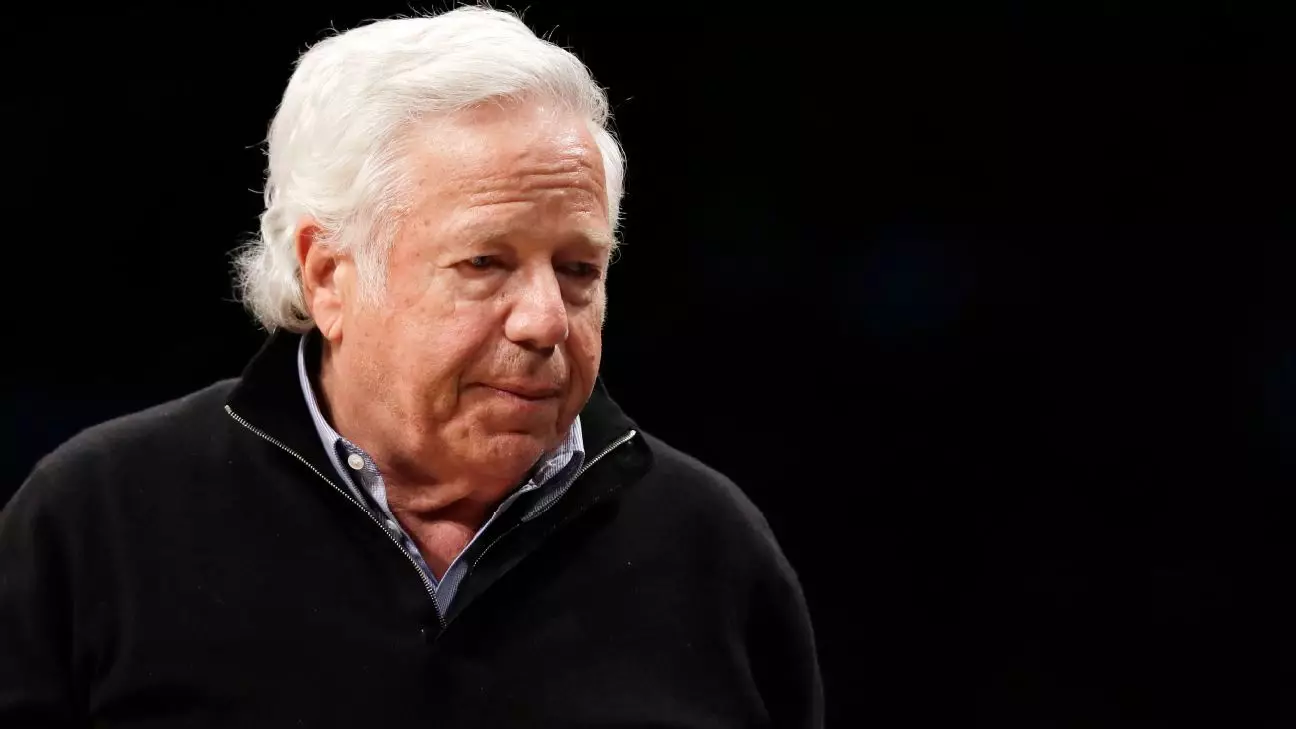For enthusiasts of professional football, the Pro Football Hall of Fame represents an enduring symbol of excellence, celebrating those who have profoundly impacted the sport. Yet this revered institution has recently sparked controversy, particularly surrounding the exclusion of Robert Kraft, the prominent owner of the New England Patriots. As Kraft, a six-time Super Bowl champion, has again been overlooked, questions arise about the criteria for induction and the visibility of contributors to the sport’s legacy.
Sources have revealed that Kraft’s hopes for induction in the 2025 class have been dashed once more, as the contributor committee of the Hall has instead put forth Ralph Hay for consideration. This decision, made on November 12, not only casts a shadow over Kraft’s illustrious career but also indicates a possible bias within the hall’s selection process. Hay, recognized as a founding figure of the NFL, has finally emerged as a nominee after years of obscurity—yet his lack of a lasting impact compared to Kraft’s achievements raises eyebrows.
At 83 years old, Kraft’s record in transforming the Patriots from a struggling franchise into a powerhouse should warrant recognition. Since 2010, he has patiently faced committee discussions with the hope that his contributions would eventually be acknowledged. Despite his extensive credentials, including a commitment to community engagement and significant financial investments in the team and league, Kraft has failed to secure a finalist spot for thirteen consecutive years.
Ralph Hay’s historical significance cannot be understated; he was pivotal in forming the league as we know it today. Historians may celebrate his contributions to the NFL’s conception, but when examining their current implications, one begins to question why Hay now receives favor from those who dictate Hall of Fame selections. Critics note the short-lived nature of Hay’s ownership of the Canton Bulldogs, which raises questions surrounding his overall legacy within professional football.
Conversely, Kraft has overseen an era of unprecedented success for the Patriots, with six Super Bowl victories and a reputation as one of the most astute football minds in ownership. Voter sentiment appears confused; many express surprise at Kraft’s ongoing exclusion, highlighting a disconnect in how voters assess contributions, particularly when juxtaposed with lesser-known historical figures.
The ongoing situation exposes flaws within the Hall’s selection mechanisms. The committee’s recent decisions illustrate not only a tug-of-war between historical figures and contemporary contributors but also a lack of transparency regarding the criteria for induction. Anecdotal evidence suggests a rebellion against the oversight of influential figures, as several voters have voiced their disappointment at Kraft’s continued absence from the finalist pool.
This year, Hay’s candidacy represents a break with tradition, coming as a surprise to many who believed Kraft’s contributions aligned more closely with the Hall’s purpose of honoring pivotal figures in football history. Moreover, with separate categories established for coaches and contributors, some speculated Kraft might find pathways that were once obstructed. Yet, the persistent failure to advance his candidacy raises questions about the effectiveness of these newly drawn boundaries.
It is important to recognize the complex interplay of history and modern contributions in evaluating NFL legacies. The disdain many feel when observing the juxtaposition of Hay’s historic impact versus Kraft’s modern successes underscores a critical need for evolution in how contributors are evaluated. A football owner who has achieved lasting success, adhered to the league’s growing commitment to social issues, and drove revenue for the sport deserves more than mere acknowledgment; they deserve induction.
As discussions continue and the next class of nominees looms, Kraft’s supporters have persisted in lobbying for recognition. Hall of Famer Bill Polian, an ardent advocate for Kraft’s induction, has pointed out the extraordinary milestones reached under Kraft’s leadership. In contrast, there remains ambivalence regarding the recognition of historical figures whose contributions seem diminished in light of more recent performance.
The 2025 Hall of Fame class raises more questions than answers about how football’s legacy is honored. Robert Kraft’s exclusion highlights the timeworn debate between recognizing historic pioneers and modern innovators, revealing inherent biases that skew perceptions in favor of nostalgic contributions rather than measurable achievements. As the selection process endures scrutiny, it may be time for the Hall of Fame to redefine its parameters for inclusion—one that better embraces the full spectrum of impact across football’s storied history, ensuring figures like Robert Kraft receive the recognition they have clearly earned.

